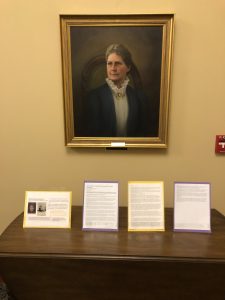On exhibit August 26 – December 1, 2020
James B. Duke Library, Second Floor Gallery

In accordance with the centennial of the 19th Amendment, “The Simple Ground of Justice”: Greenvillians in the Fight for Women’s Suffrage will open on August 26 and be on display until December 2020. Curated by Dr. Courtney Tollison, Distinguished University Public Historian and Scholar, and Furman’s Special Collections and University Archives, the exhibit features a collection of suffrage postcards, a 1917 “blue book” on the national women’s suffrage movement, images of and writings from Greenville Woman’s College Principal Mary C. Judson, the 1915 Bonhomie, and an artifact from the Thursday Club, a Greenville women’s club founded in 1889 that remains in existence.
 Though the Rollin sisters, five African American sisters in Columbia, organized the first statewide suffrage organization in the early 1870s and were early advocates of both African American and women’s rights in the state, the suffrage movement did not come to Greenville until 1890, when a small group of white women and at least one man held a women’s rights convention and established the South Carolina Equal Rights Association. Greenville women such as Mary P. Gridley, A. Viola Neblett, and Helen E. Vaughan led the local movement, which switched its affiliation from the more mainstream National American Woman Suffrage Organization to the more radical National Woman’s Party in 1917.
Though the Rollin sisters, five African American sisters in Columbia, organized the first statewide suffrage organization in the early 1870s and were early advocates of both African American and women’s rights in the state, the suffrage movement did not come to Greenville until 1890, when a small group of white women and at least one man held a women’s rights convention and established the South Carolina Equal Rights Association. Greenville women such as Mary P. Gridley, A. Viola Neblett, and Helen E. Vaughan led the local movement, which switched its affiliation from the more mainstream National American Woman Suffrage Organization to the more radical National Woman’s Party in 1917.
 The 19th Amendment was formally adopted into the U.S. Constitution on August 26, 1920, and women across the country were eligible to vote in the presidential election on November 2 that year. Women’s suffrage in southern states like South Carolina, however, meant suffrage for white women only. African American women endured and won a much longer fight that culminated in the Voting Rights Act of 1965.
The 19th Amendment was formally adopted into the U.S. Constitution on August 26, 1920, and women across the country were eligible to vote in the presidential election on November 2 that year. Women’s suffrage in southern states like South Carolina, however, meant suffrage for white women only. African American women endured and won a much longer fight that culminated in the Voting Rights Act of 1965.
The South Carolina legislature rejected the 19th Amendment in January 1920, and soon after it became federal law, the General Assembly passed legislation that deemed women ineligible for jury duty. This law remained in place until 1967. In 1969, the year before the 50th anniversary of the 19th Amendment, six states, including South Carolina, had yet to rubber stamp the 19th Amendment. The SC General Assembly did so that year, long after most states but before Georgia and Louisiana (1970), North Carolina (1971), and Mississippi (1984).
